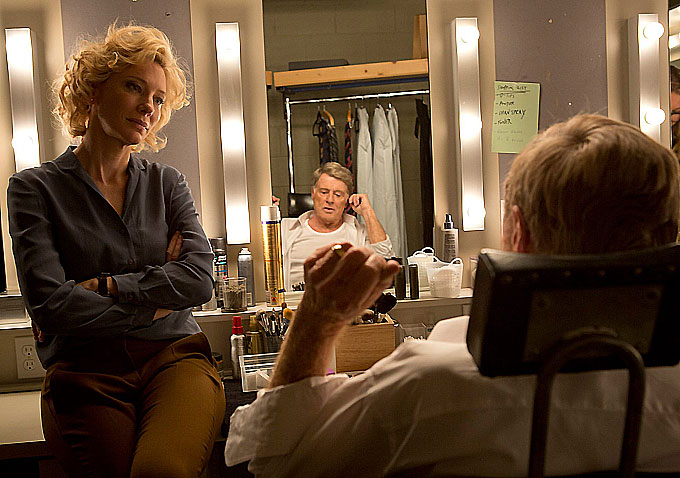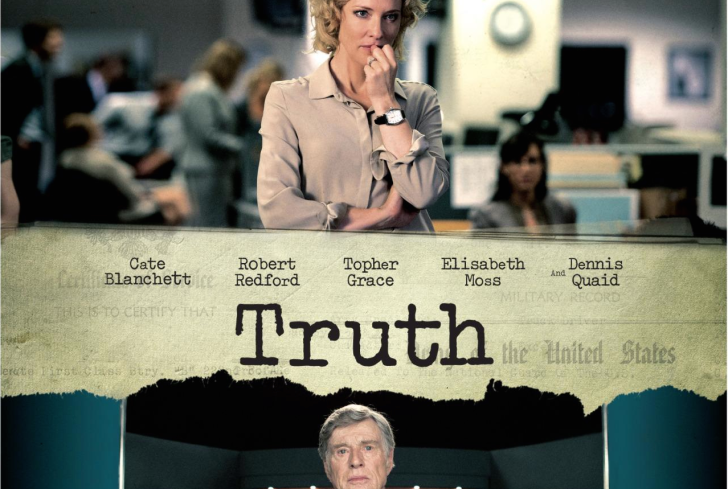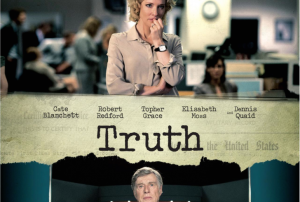Truth
Posted on October 22, 2015 at 5:03 pm

Often a movie “based on a true story” confirms and extends our understanding of what happened. This film, based on the “true story” that led to the departure of one of the most respected newsmen of all time, Dan Rather, from CBS, asserts its ambitions with its title and goes on to explore the very nature of truth and our willingness or ability to uncover and recognize it. I did not have strong views about what happened in 2004, just a recollection of the incident as a turning point, with the most respected broadcast journalist in the country being brought down by bloggers, who were able to determine that documents relied on in a story about President George W. Bush were forgeries. In my mind, the story was about the shift from old to new media, where the Davids of the blogosphere could challenge the powerful Goliaths of CBS News.
But in this movie, based on the book by Rather’s producer, Mary Mapes (Cate Blanchett, blazingly intelligent and forceful), we see another side of the story, written by James Vanderbilt. This is her version (if there is such a thing as versions) of the truth.
No matter which version of the story you believe, lesson number one of this movie is that you are at your most vulnerable when you feel most powerful. Mapes has just come off the greatest triumph of her career, the Peabody award-winning story about the horrific abuse of prisoners by the US military at Abu Ghraib. She is looking for another great scoop, and as the Presidential election approaches, it looks like she has one. Rumors about special treatment for George W. Bush, both in being allowed to serve in the National Guard and during his time there, have circulated for years, and now there seems to be substantiation, including on-the-record statements by the former Lieutenant Governor and some memos from the younger Bush’s commanding officer. Four document experts were called in by Mapes to authenticate the documents and, with the proviso that as photocopies there was no way to test the ink or paper of the originals to verify them completely, the experts signed off. The other steps taken by Mapes and the staff of reporters, including research expert Mike Smith (Topher Grace, who should be in more movies) and former military officer Dennis Quaid (ditto), are impressive. But it is possible that their supervisors did not ask enough questions and it is certain that moving up the broadcast date at the last minute cut off their ability to lock down all of the story.
And then it all fell apart. Bloggers identified problems with the memos’ fonts that indicated they were created on a computer, not a typewriter, and thus could not have been written in the 1970’s. CBS convened a commission led by a former (Republican) Attorney General to review the story. Their focus was not as much on whether the story was true or not (the memos were just one small part of the story) but whether the reporters had a political agenda.
A lot of people got fired. Smith makes a speech on the way out the door that identifies a culprit more insidious than partisan politics — corporate conflicts of interest. There are times when protection of shareholder value is not consistent with getting the story. The most important question this movie asks is what that means for democracy and for, well, truth.
Parents should know that this movie has very strong language and brief nudity in a photograph. Characters drink and take medicine to deal with stress. There are references to torture and child abuse and there are tense confrontations.
Family discussion: What should Mary have done differently? How did her childhood experiences affect her relationship with Rather and her response to her father? Should she have followed her lawyer’s advice?
If you like this, try two other fact-based films about journalists fighting to expose the truth about powerful people: “All the President’s Men” and “Spotlight“



